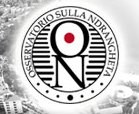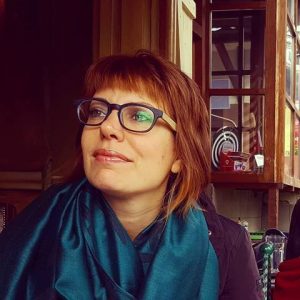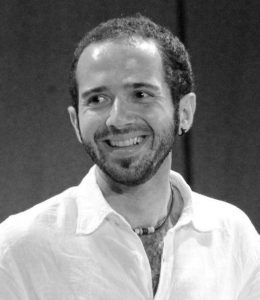Today we talked with our friends a nd partners at the Osservatorio contro la ndrangheta, a cultural association based in Reggio Calabria, Italy. The Osservatorio has been active against organised crime – ndrangheta, as the mafia in Calabria is known – since 2007 through research, awareness raising and education with schools and universities, including the Humboldt university in Berlin. What we particularly like about the Osservatorio is the work they do in the re-use of confiscated assets as an education tool and to promote sustainable tourism. You can read more about their work here: http://osservatoriosullandrangheta.org
nd partners at the Osservatorio contro la ndrangheta, a cultural association based in Reggio Calabria, Italy. The Osservatorio has been active against organised crime – ndrangheta, as the mafia in Calabria is known – since 2007 through research, awareness raising and education with schools and universities, including the Humboldt university in Berlin. What we particularly like about the Osservatorio is the work they do in the re-use of confiscated assets as an education tool and to promote sustainable tourism. You can read more about their work here: http://osservatoriosullandrangheta.org
We asked Stefania Ziglio, EU project manager and Federico Alagna, independent researcher at the Osservatorio to tell us a bit more about their work and the fight against stolen assets in Italy.
By the way: CiFAR and the Osservatorio are organising with other partners a summer school in 2017 in Messina, Sicily. We want to bring together young activists throughout Europe and outside to learn more on how to work on stolen assets. Stay tuned for more!
Stefania, what do you do at the Osservatorio Sulla Ndrangheta?
 Stefania: “I have mainly been dealing with writing project proposals in the framework of EU or national calls for proposals, organizing cultural events, managing and monitoring the manifold activities carried out at the Osservatorio. This goes from research and studies on the ndrangheta and on the social re-use of confiscated assets to educative and training activities – through theater and music workshops – aimed at raising the awareness of young people and at fighting the stereotypes and attitudes related to the “mafia mentality”.”
Stefania: “I have mainly been dealing with writing project proposals in the framework of EU or national calls for proposals, organizing cultural events, managing and monitoring the manifold activities carried out at the Osservatorio. This goes from research and studies on the ndrangheta and on the social re-use of confiscated assets to educative and training activities – through theater and music workshops – aimed at raising the awareness of young people and at fighting the stereotypes and attitudes related to the “mafia mentality”.”
Why did you start working there and what part of your job at the Osservatorio excites you most?
Stefania: “I moved from northern Italy – Padova – to Reggio Calabria at the end of 2012 since I perceived the great value of the innovative methodology used to develop an indirect inculturation alongside a direct inculturation in the field of the cultural fight against mafias. When the Osservatorio was born, in 2007, and started speaking about the ndrangheta, organizing conferences, gathering academics, judges, representatives of police forces, civil society, and members of the church with different background and scientific approaches to discuss successes, gaps and failures in the fight against the ndrangheta. I thought this was an absolutely courageous cultural operation without precedent. The Association’s slogan was, indeed: “Ndrangheta. The first step is naming it.”
The thing which excites me most is having the opportunity to transfer knowledge to young people and involve them in projects related to the social re-use of confiscated assets with the aim of giving them concrete opportunities to use their professional skills in Calabria.”
Federico, you have been researching extensively the phenomenon of organised crime and asset recovery. What are the main problems in recovering, confiscating stolen assets and managing in Italy today?
Federico: “Even though the Italian asset recovery legislation is probably one of the  most advanced in a comparative perspective, there are definitely some problems and challenges that still need to be addressed. In particular, I would mention the long duration of trials and, consequently, of the freezing process; the challenges in managing frozen and confiscated companies, which leads to the wrong message that illegal economy can succeed where legal economy fails; and, last but not least, the overall management of the frozen and confiscated assets, especially due to the impressive amount of them and to the conditions in which they are (they often need a lot of public investments before the re-use phase).”
most advanced in a comparative perspective, there are definitely some problems and challenges that still need to be addressed. In particular, I would mention the long duration of trials and, consequently, of the freezing process; the challenges in managing frozen and confiscated companies, which leads to the wrong message that illegal economy can succeed where legal economy fails; and, last but not least, the overall management of the frozen and confiscated assets, especially due to the impressive amount of them and to the conditions in which they are (they often need a lot of public investments before the re-use phase).”
So, what reforms and steps are needed to tackle these issues?
Federico: “The overall management system should be improved. The establishment of an asset recovery office in 2010 was definitely an important step, but there are still some basic conditions missing to make it work properly (from the organisation of the office, to budget autonomy and beaureaucratic provisions). Furthermore, some criminal law reforms – especially concerning the duration of trials – should be taken into serious consideration, trying to speed up them, without jeopardising the right to a fair trial.”
What do you think citizens can do to prevent further public asset theft and how can they participate in the recovery process?
Federico: “The Italian system of social re-use is definitely a best practice that actively involves citizens in the recovery process and bring in the crucial concept that what was taken illegally by criminals or used by them to perpetrate their activities can now become a place to carry out social activities and rebuild a sense of community. A more widespread awareness of what really matters for organised crime and corruption perpetrators – i.e. money – is also needed, to allow citizens to take part in all those civic, social and political actions that try to prevent these activities and to make sure that crime does not pay.”
